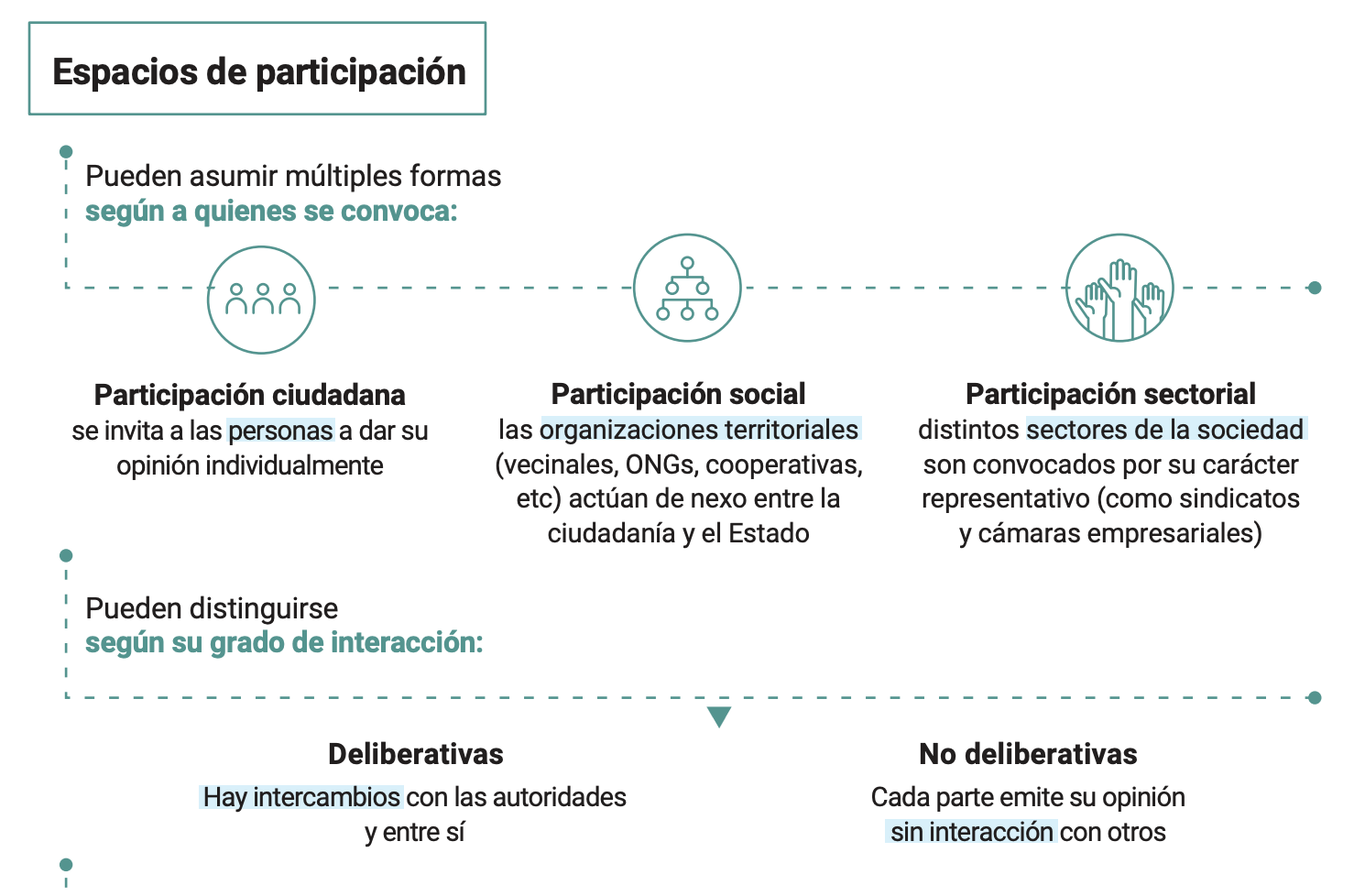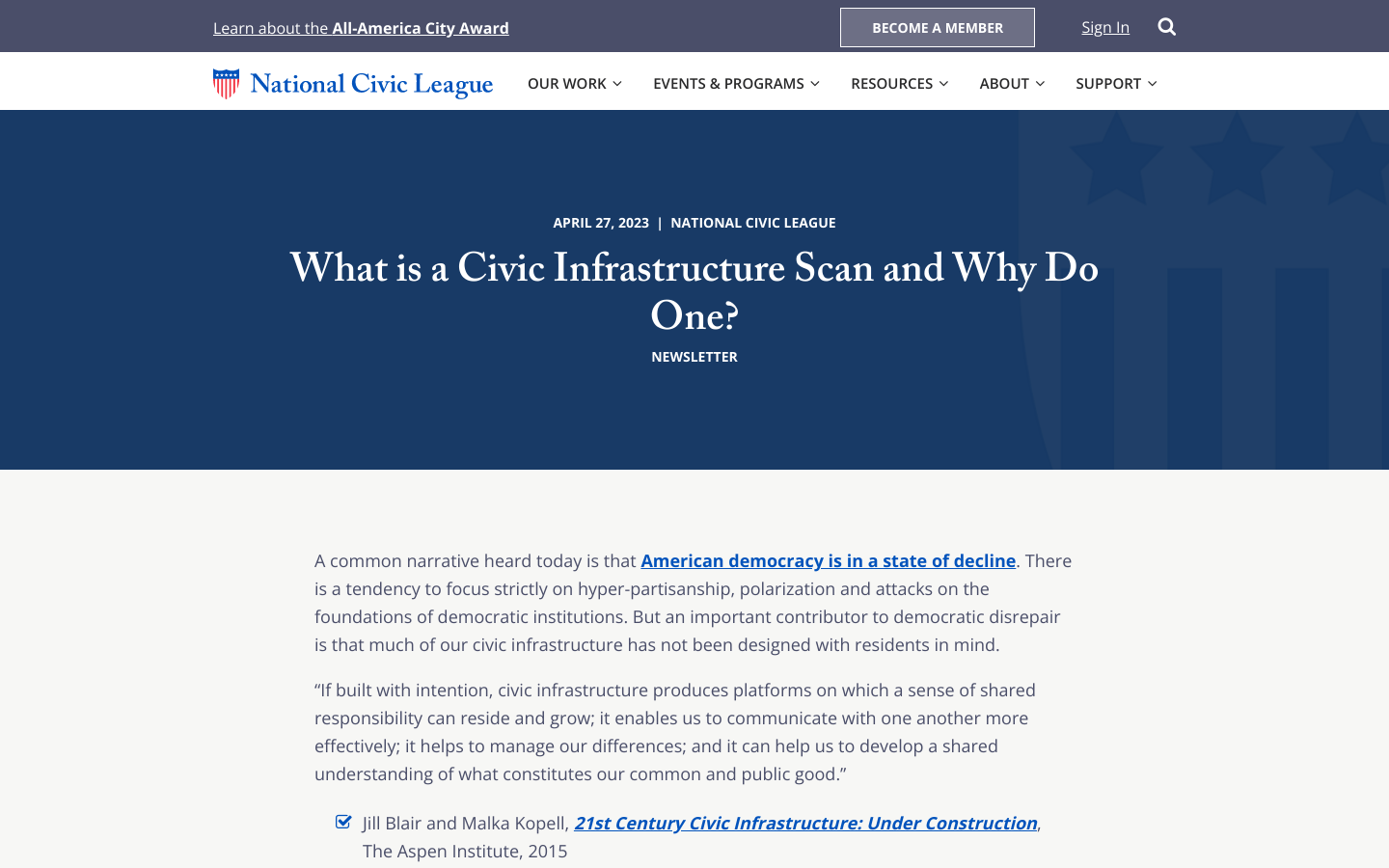Civic Tech Field Guide
Sharing knowledge and productively growing the fieldTag: Format > guides - (114)
Showing 114 Results

Google Sheet overview of guides to digital protection for human rights defenders, activists, journalists, and other at-risk communities

Activist Checklist
Eugene, Oregon, USAPlain language steps for digital security. Because protecting yourself helps keep your whole community safer.

Data Governance Wegweiser
Humboldt-Institut Berlin, Invalidenstraße, Berlin, GermanyDu willst wissen, wie du Daten sinnvoll und rechtssicher in deinem Vorhaben einsetzen kannst?

Abordaje conceptual y metodológico para la incorporación de las preferencias de la ciudadanía en políticas públicas

Community Partnerships Playbook
Detroit, MIHow to Create Equitable Partnerships between Technical and Community Experts

Productive Ways to Use GenAI for Civil Servants
2300 N Street Northwest, Washington, DC 20037, USAThis playbook is designed specifically for civil servants, offering practical guidance for using generative AI (GenAI) to help them perform their work more effectively and efficiently.

This manual aims to empower individuals in their roles as citizen scientists and to promote the practice of community-based citizen science as a vehicle for environmental justice.

EFF’s Street-Level Surveillance project shines a light on the surveillance technologies that law enforcement agencies routinely deploy in our communities.

Types of Voting System
United Kingdom of Great Britain and Northern Ireland (the)Different voting systems have a variety of different features, ranging from how proportional they are (whether seats in parliament reflect votes cast), the connection between MPs and their communities and the extent to which voters can choose between different candidates.

Private Alert System
San FranciscoAlert people privately through a system that protect their privacy - without texts, emails or phone calls.

Using AI Now to Improve Movements’ Effectiveness: A Basic Introduction Guide for Social Activists
Harvard University, Cambridge, MA, USAFreddy Guevara offers a fundamental playbook for social activists on how to augment advocacy efforts with artificial intelligence technologies

No matter if your newsroom has an established AI policy or if you are just getting started, here are 5 key challenges to consider and 5 practical recommendations for establishing a trust-based AI policy based on insights from the publishers participating in the AI Collaborative and Fellowship

Hedging for Sustainability: Twenty Revenue Streams for Democracy, Rights, and Governance Non-Governmental Organizations
Washington, DCNGOs in the democracy, rights, and governance space are facing unprecedented cuts to their funding. This blog explores new revenue streams to help them continue their critical work.

Federal Employee Resource Hub
United States of America (the)Partnership for Public Service's resource for you to answer the questions we are frequently asked about how various proposals may affect federal employees, to create a safe space for information sharing and community building, and most of all, to respond to what you need in this moment and in the months to come.

The Situate AI Guidebook: Co-Designing a Toolkit to Support Multi-Stakeholder Early-stage Deliberations Around Public Sector AI Proposals
Carnegie Mellon UniversityBy Anna Kawakami, Amanda Coston, Haiyi Zhu, Hoda Heidari, Kenneth Holstein

Emerging Tech Primers
AspenOur team at Aspen Digital is defining and mapping, in plain terms, emerging technology topics to help impacted communities, social scientists, journalists, and policymakers become familiar with the issues and opportunities so that they can steer the current state and future promise of these tools.

Newspeak Safe Bets on AI
133 Bethnal Green Road LondonA newsletter issue with a great summary of back-office efficiencies for social good organisations using AI

Activists Resource Hub
United Kingdom of Great Britain and Northern Ireland (the)We’ve put this guide together to point you to some of the brilliant resources available for UK activists.

دليل الأمن الرقمي للنشطاء في الشرق الأوسط وشمال أفريقيا (Digital Security Guide for Activists in the Middle East and North Africa)
Middle East and North Africaقامت أكساس ناو بإعداد دليل الأمن الرقمي بهدف تقديم الدعم للأشخاص في منطقة الشرق الأوسط وشمال أفريقيا الذين يسعون لحماية أنفسهم من التهديدات الرقمية والبقاء آمنين على الإنترنت. (Access Now has created this Digital Security Guide to support people in the MENA region who are looking to protect themselves from digital threats and stay safe online.)

The recent wave of protests calling for peace in Palestine have been met with unwarranted and aggressive suppression from law enforcement, universities, and other bad actors. It’s clear that the changing role of surveillance on college campuses exacerbates the dangers faced by all of the…

Community Tool Box
Lawrence, KansasThe Community Tool Box is a free, online resource for those working to build healthier communities and bring about social change.

ICTs in Elections Database
Sweden (Sverige)In order to help election practitioners and stakeholders to better understand the use of ICTs in elections, International IDEA has conducted a global comparative study to learn how ICTs are being used in several stages of electoral process.

Global Cyber Alliance Cybersecurity Toolkit for Mission-Based Organizations
United States of America (the)This set of free tools, guidance, and training is designed to help organizations take key cybersecurity steps and be more secure.

data.org Guide Finder
2300 N Street Northwest, Washington, DC 20037, USAUse the Guide Finder to explore proposed approaches to common data for social impact challenges.

Design Action Research with Government
1 City Hall Square, Boston, MA, United StatesDesign Action Research with Government (DARG) is a guide for creating civic innovation projects.

City-Level Decision-Making Tool
Orlando, Florida, USAThe Society Library (a collective intelligence institute) shared their micro-voting decision-making tool for city-level decision-making.

Civic Infrastructure Scan
Washington, DCTo build the foundations of democracy with intention, as Jill Blair and Malka Kopell suggest, there is a need to survey the types of civic infrastructure in place and how these building blocks fit together in order to appreciate where the cracks and crevices are that need strengthening.

Community Data Dialogues
Washington, DCLearn how to host events to engage non-technical audiences on open data

Commons Library
AustraliaThe Commons Library includes 1000+ educational resources in a range of formats. Topics include campaign strategy, community organising, working effectively in groups, justice and diversity, creative activism, and much more.

Moving from reflection to action: Guide on transparency and accountability for philanthropic organizations
United States of America (the)Download our free guide on Transparency and Accountability for Philanthropic Organisations

Process code for software procurement
AmsterdamThis process code will introduce you to a digital-native approach to procurement. It maintains the core principles of public procurement—fairness, transparency and objectivity—but realigns the process with contemporary software development.

International Journalists' Network
Washington, DCIJNet delivers the latest on global media innovation, news apps and tools, training opportunities and expert advice for professional and emerging journalists worldwide.

Civic AI Handbook
LondonThe Civic AI Handbook is for digital leads of civic organisations who want to develop generative AI strategies for their organisations / departments / teams.

Deceptive Patterns
LondonA taxonomy of deceptive design patterns, laws, cases, reading list, hall of shame, and Deceptive Patterns book

Civicspace.tech
Washington, DCA collection of approachable but well-researched primers on emerging tech and potential benefits and risks

The Guide features governance approaches for data that is owned or in possession of a city or county.

UN HABITAT Digital Cities Toolkit
58 Victoria EmbankmentAn open source Policy Toolkit for cities to develop digital policies that put citizens at the center, tackle Sustainable Development Goals and make Governments more open, transparent, and collaborative.

Por un Entorno Digital Accesible (PUEDA)
ArgentinaLa iniciativa tiene como principal objetivo difundir conceptos clave y buenas prácticas de la accesibilidad digital en el Estado, la sociedad civil, la academia y los sectores privado y técnico, actores críticos a la hora de alcanzar entornos digitales accesibles.

Network Impact has created a series of Network Know-How Guides for early-stage network builders who want to learn how to develop healthy, impactful and sustainable networks.
![Disclosure logs: a best practice guide for local authorities [in the UK]](https://s3.us-east-1.amazonaws.com/ctfg-airtable/screenshots/3856616539.jpg)
Disclosure logs: a best practice guide for local authorities [in the UK]
United Kingdom of Great Britain and Northern Ireland (the)Guide that "seeks to explain what disclosure logs are, how to manage them efficiently and why, although they are not a legal requirement, local authorities should seriously consider using one for the benefit of your FOI teams and, more importantly, for citizens."

HOT's Approach to OSM Data Validation for Earthquake Response Mapping
1100 13th Street NW Suite 800 Washington, D.C. 20005Because OpenStreetMap is a crowd-sourcing project where everyone can freely contribute to the map, the Humanitarian OpenStreetMap Team has devised measures to support high-quality crowd-sourced OSM data.










